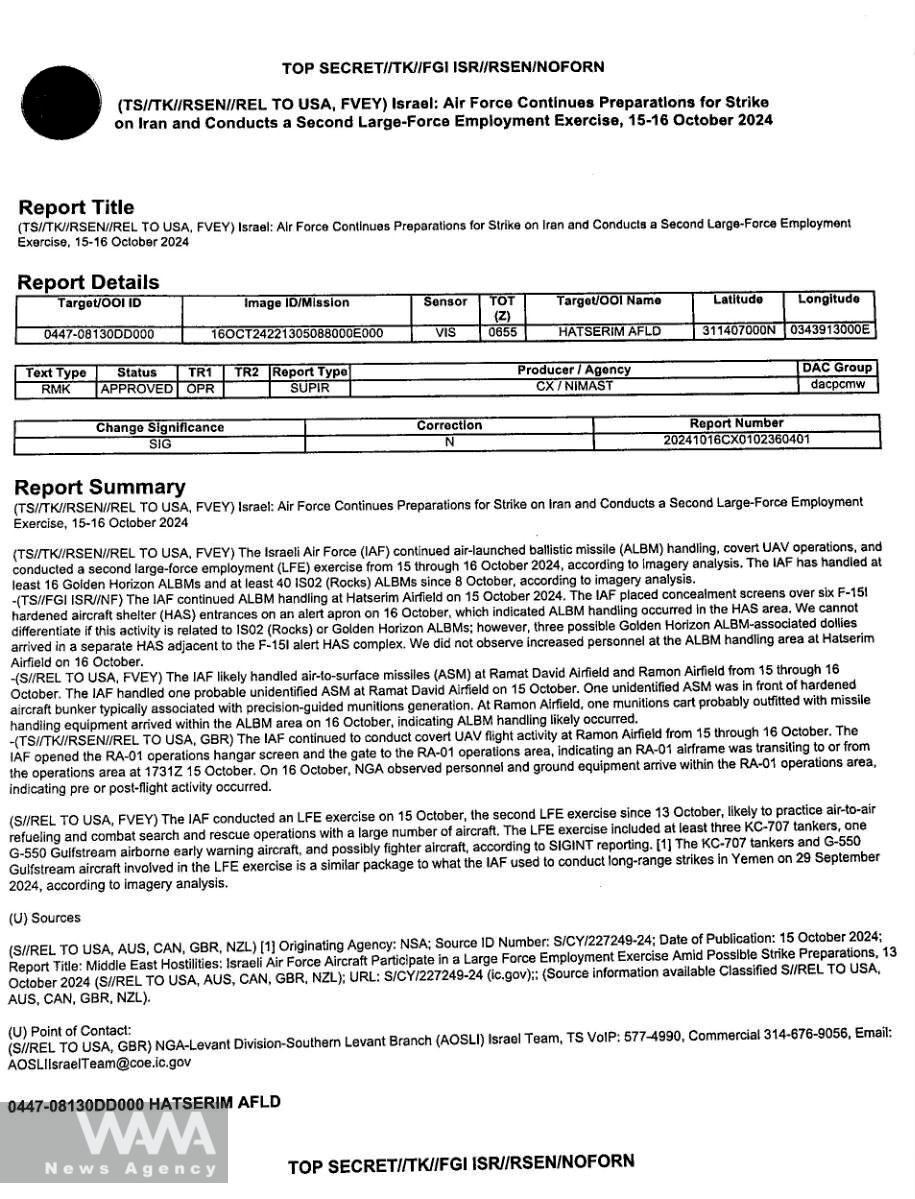Behind the Scenes of Israel’s Plan to Attack Iran
WANA (Oct 22) – Recently, two highly classified documents, allegedly from the Pentagon, revealing details of a potential Israeli attack on Iran, have been leaked on Telegram. These documents, first published by the channel “Middle East Spectator,” outline Israel’s possible plans for strikes on targets within Iran. The documents discuss Israeli military operations, including the transfer of advanced munitions and simulations of airstrikes on Iran.
According to this information, the U.S. has been closely monitoring Israeli Air Force activities at military bases since October 8, including the transfer of advanced ammunition in preparation for this potential operation.
One of the leaked documents, titled “Israel: Air Force Continues Preparations for Strike on Iran,” describes recent Israeli military exercises simulating an attack on Iran. The second document reveals Israel’s arrangements for positioning missiles and military equipment in case of an Iranian retaliatory strike.

highly classified documents, allegedly from the Pentagon, revealing details of a potential Israeli attack on Iran, have been leaked on Telegram. Social Media/ WANA News Agency
The leaked Pentagon documents indicate that the purpose of Israel’s recent military drills and maneuvers was to simulate aerial refueling and search-and-rescue operations. These sensitive documents also detail the transfer of munitions, training by the Israeli Air Force on the use of long-range ballistic missiles, air-to-ground missiles, refueling aircraft, and other support planes.
The Pentagon leaks also suggest that the number of Israeli forces involved in these simulations is similar to those deployed in the October 8 attack on Yemen. Moreover, the documents affirm a long-held but unconfirmed reality: Israel possesses nuclear weapons.
Given the sensitive nature of this leak, multiple speculations have arisen regarding its purpose and the source of the information. Some analysts suggest that the leak was deliberate, aimed at shifting regional security dynamics or preventing further escalation of conflicts. Others speculate that these documents might be part of a psychological warfare effort to distract Iran. Still, the possibility of an accidental leak or a breach in U.S. intelligence systems remains.

Possible Scenarios Behind the Information Leak
1. Deliberate Release by the U.S. to Shift Security Dynamics:
One of the main theories is that this leak was intentional, potentially part of a U.S. strategy to manage tensions in the region. As Washington tries to prevent direct conflict between Israel and Iran amidst global tensions, the disclosure of Israel’s military plans could be used as a tool to pause this trajectory. With the U.S. presidential elections approaching, the Biden administration is particularly keen to avoid a Middle Eastern crisis that could destabilize international security and weaken its chances of re-election.
After Iran’s October 1 missile strike on Israel, where nearly 180 ballistic missiles were fired, Israel named Iran’s nuclear and oil facilities as potential targets for retaliatory strikes. In response, Iran warned both Israel and the U.S. that its retaliation would be far harsher than the previous “Operation True Promise 2.” Iranian Foreign Minister Abbas Araghchi explicitly stated that if Israel carried out military action against Iran, American military personnel stationed as operators of the THAAD missile defense system in Israel would also not be spared.

Hypotheses on the Next Destabilization Attempts by the U.S. and Israel
WANA (Oct 08) – Following the destruction of Gaza, the martyrdom of Hamas leaders, and efforts to suppress resistance groups, Israel is now aiming to dismantle the political structures in Gaza. The goal is to merge Gaza with the Palestinian Authority, but this project requires eliminating and weakening the arms of resistance. From Israel’s […]
This is not the only challenge facing the U.S. The Gaza conflict has entered its second year, and Israel’s continued atrocities in Gaza and Lebanon have drawn direct blame toward the U.S.
The increasing shipment of U.S. military supplies to Israel has solidified the notion that the U.S., as Israel’s chief supporter, is the main party responsible for the killing of Palestinians and Lebanese civilians. The U.S.’s guilt in the Gaza massacres is as significant as, if not greater than, that of the Israelis. The Biden administration’s project to whitewash its role—of which the deliberate leak of Israel’s attack plans may be a part—is unlikely to succeed.
This theory is further supported by the notion that Israel, having secured strong U.S. backing in recent months, is preparing for a major action against Iran. The leak of these documents could force Tel Aviv to reconsider and potentially prevent a full-scale war. In this scenario, the U.S. may have leaked the information intentionally to push Israel towards diplomacy or delay any military action.

The Relationship Between U.S. Elections and Israel’s Reaction to Iran’s Missile Operations
WANA (Oct 18) – With only three weeks left until the U.S. elections, the race between Kamala Harris and Donald Trump remains tight. Given that Trump is the architect of the Abraham Accords, which normalized relations between Israel and several Arab countries, he is keen to ensure his diplomatic achievements endure. Furthermore, Trump’s hostility […]
2. Benefiting Iran:
Some analysts believe that this leak could indirectly benefit Iran. Several hypotheses are proposed within this scenario:
First hypothesis: Iran itself may have been involved in the leak, aiming to expose Israel’s military plans and prevent an attack. Iran has denied any involvement in the leak.
Second hypothesis: A third-party actor could be involved. In this theory, an unknown party might have released the information with the goal of preventing further military conflicts in the region. While no specific actor has been identified, the possibility of a foreign power intervening to control regional tensions has been raised.

A billboard with a picture of the late Hamas leader Yahya Sinwar is displayed on a building in Tehran, Iran, October 19, 2024. Majid Asgaripour/WANA (West Asia News Agency)
3. Psychological Warfare and Misinformation:
This theory suggests that the U.S. and Israel might have coordinated the release of false documents to mislead Iranian military planners. By doing so, they could disrupt Iran’s military strategy while accelerating their preparations. Psychological warfare and the use of disinformation have a long history in military conflicts, and this tactic could be another example.
4. Intelligence Failure:
In addition to the intentional theories, the possibility of an accidental leak also exists. Despite sophisticated security systems, history has shown that no intelligence apparatus is completely immune to unforeseen leaks. Examples such as the WikiLeaks revelations or Edward Snowden’s disclosures demonstrate that even the strongest intelligence systems can be compromised from within. If this leak was accidental, it indicates serious flaws in U.S.-Israeli intelligence cooperation, which could have wider implications.

Israeli Espionage Through Telegram
WANA (Oct 03) – Israel has elaborated on its intelligence capabilities and the extensive assassinations of high-ranking officials from the Islamic Revolutionary Guard Corps, Hezbollah in Lebanon, and Syria, all within a remarkably short period of less than 45 days. Israeli television reported that the “Paris Deal,” mentioned in the media regarding the arrest […]
This scenario is particularly significant because the exposure of such sensitive information could undermine the trust between the two countries. U.S.-Israeli intelligence cooperation is a cornerstone of Middle Eastern security, and any disruption in this relationship could increase instability in the region. The leak may serve as a warning to Tel Aviv to exercise greater caution in its military planning.
5. Israeli Involvement in the Leak:
Another scenario worth considering is that Israel itself may have been behind the leak. It is likely that this move was aimed at pressuring the U.S. into providing more military and financial aid. The release of these documents could help Tel Aviv secure additional support from Washington for its planned attack on Iran.
Regional and International Consequences
Whether the leak was accidental or intentional, if the documents are genuine, their impact on regional dynamics is undeniable. With this disclosure, Iran is now aware of Israel’s military movements, likely prompting it to strengthen its defensive measures. Iran may also use this leak as a diplomatic tool to pressure Israel by enhancing its relations with regional allies.

A billboard with a picture of Iranian Revolutionary Guards (IRGC) deputy commander Brigadier General Abbas Nilforoushan and late Lebanon’s Hezbollah leader Hassan Nasrallah and late Hamas leader Ismail Haniyeh is displayed in Tehran, Iran, October 18, 2024. Majid Asgaripour/WANA (West Asia News Agency) via REUTERS ATTENTION EDITORS – THIS IMAGE HAS BEEN SUPPLIED BY A THIRD PARTY Wana News Agency
On the other hand, Israel, which has always sought to keep its military plans secret, now faces a serious challenge. Tel Aviv’s silence in the wake of this leak may indicate the regime’s anger and confusion. Israel, which has typically avoided openly confirming its attacks on Iran, now finds itself in a position where its plans have been exposed, potentially limiting its military manoeuvrability.
The leak of these documents not only affects U.S.-Israeli relations but could also have broader international repercussions. The U.S. may face domestic and international pressure to explain the source of the leak. Additionally, the breach of trust between Washington and Tel Aviv could severely weaken future security cooperation between the two nations. Some analysts believe that this leak could lead to a deterioration in U.S.-Israeli security cooperation, with Israel potentially acting more independently.

Seven Scenarios of Israel’s Possible Response to Iran’s Missile Attack
WANA (Oct 06) – Amid rising tensions and ongoing conflicts in the region, and following a missile attack by Iran during Operation “True Promise 2,” various analyses have emerged regarding how Israel might respond. The following seven scenarios outline potential Israeli responses, each carrying its own implications for regional stability and international relations. […]
It will be difficult for the U.S. to ignore the leak completely, as it directly affects the security of its primary Middle Eastern ally. Even if the leak was not intentional, a thorough investigation is expected to determine its source, and its impact on U.S. intelligence cooperation with other allies will also be scrutinized.
In summary, this intelligence leak highlights the fragility of Middle Eastern security and the far-reaching consequences of information leaks on international relations and military strategies. For Israel, this exposure may result in lost military opportunities and impose additional constraints on future attacks. For Iran, it presents an opportunity to leverage the situation diplomatically and bolster its defence preparations.

To Attack or Not? The Realities Behind Israel’s Threats Against Iran
WANA (Oct 11) – Despite Netanyahu’s repeated threats and extensive international media coverage, no practical action has been taken by Israel against Iran. But what are the reasons for this delay? Here are five key factors that have prevented Israel from attacking Iran and show that the decision is more complex than it initially seemed. […]













